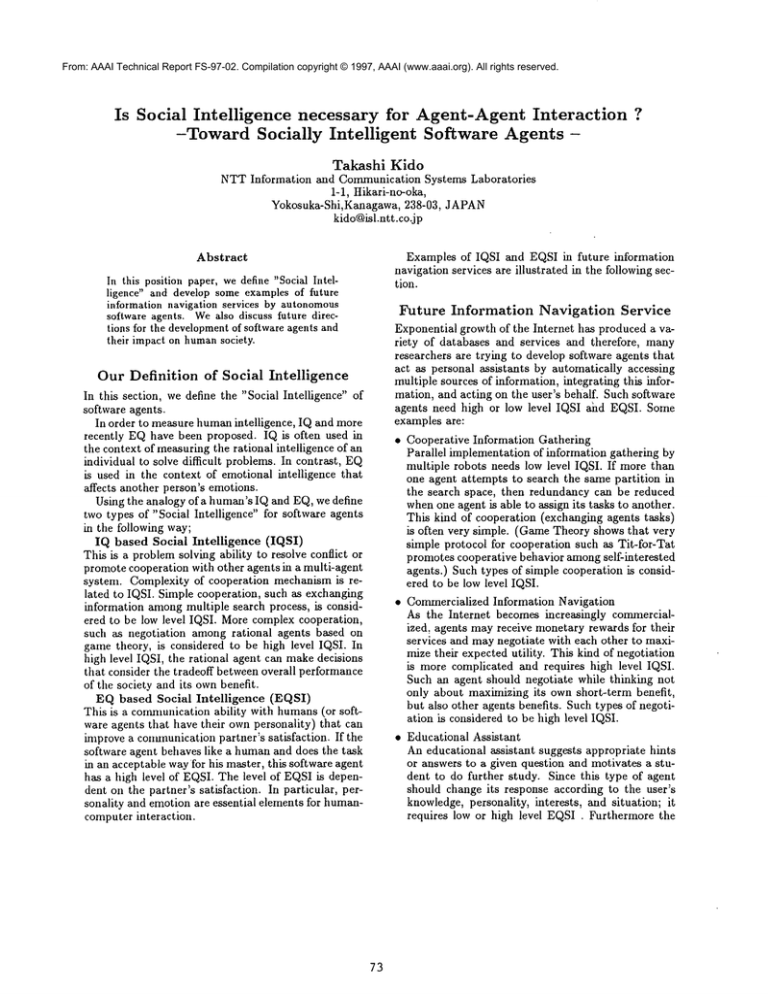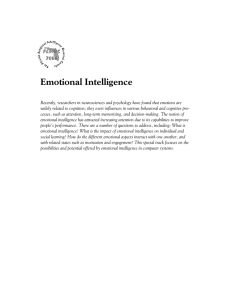
From: AAAI Technical Report FS-97-02. Compilation copyright © 1997, AAAI (www.aaai.org). All rights reserved.
Is
Social Intelligence
necessary for Agent-Agent Interaction
-Toward Socially
Intelligent
Software Agents -
?
Takashi Kido
NTT Information
and Communication Systems Laboratories
1-1, Hikari-no-oka,
Yokosuka-Shi,Kanagawa,
238-03, JAPAN
kido@isl.ntt.co.jp
Examples of IQSI and EQSI in future information
navigation services are illustrated in the following section.
Abstract
In this position paper, we define "Social Intelligence" and develop some examples of future
information navigation services by autonomous
software agents. Wealso discuss future directions for the developmentof software agents and
their impact on humansociety.
Our Definition
of
Social
Future
Information
Navigation
Service
Exponential growth of the Internet has produced a variety of databases and services and therefore, many
researchers are trying to develop software agents that
act as personal assistants by automatically accessing
multiple sources of information, integrating this information, and acting on the user’s behalf. Such software
agents need high or low level IQSI and EQSI. Some
examples are:
Intelligence
In this section, we define the "Social Intelhgence" of
software agents.
In order to measure human intelligence,
IQ and more
recently EQ have been proposed. IQ is often used in
the context of measuring the rational intelligence of an
individual to solve difficult problems. In contrast, EQ
is used in the context of emotional intelligence that
affects another person’s emotions.
Using the analogy of a human’s IQ and EQ, we define
two types of "Social Intelligence" for software agents
in the following way;
IQ based Social Intelligence
(IQSI)
This is a problem solving ability to resolve conflict or
promote cooperation with other agents in a multi-agent
system. Complexity of cooperation mechanism is related to IQSI. Simple cooperation, such as exchanging
information among multiple search process, is considered to be low level IQSI. More complex cooperation,
such as negotiation among rational agents based on
game theory, is considered to be high level IQSI. In
high level IQSI, the rational agent can make decisions
that consider the tradeoff between overall performance
of the society and its own benefit.
EQ based Social Intelligence
(EQSI)
This is a conmmnication ability with humans (or software agents that have their own personality) that can
improve a conununication partner’s satisfaction.
If the
software agent behaves like a human and does the task
in an acceptable way for his master, this software agent
has a high level of EQSI. The level of EQSI is dependent on the partner’s satisfaction.
In particular, personality and emotion are essential elements for humancomputer interaction.
¯ Cooperative Information Gathering
Parallel implementation of information gathering by
multiple robots needs low level IQSI. If more than
one agent attempts to search the same partition in
the search space, then redundancy can be reduced
when one agent is able to assign its tasks to another.
This kind of cooperation (exchanging agents tasks)
is often very simple. (Game Theory shows that very
simple protocol for cooperation such as Tit-for-Tat
promotes cooperative behavior among self-interested
agents.) Such types of simple cooperation is considered to be low level IQSI.
¯ Commerciahzed Information Navigation
As the Internet becomes increasingly
commercialized, agents may receive monetary rewards for their
services and may negotiate with each other to maximize their expected utility. This kind of negotiation
is more complicated and requires high level IQSI.
Such an agent should negotiate while thinking not
only about maximizing its own short-term benefit,
but also other agents benefits. Such types of negotiation is considered to be high level IQSI.
¯ Educational Assistant
An educational assistant suggests appropriate hints
or answers to a given question and motivates a student to do further study. Since this type of agent
should change its response according to the user’s
knowledge, personality, interests, and situation; it
requires low or high level EQSI . Furthermore the
73
agents should observe the user’s response and select the best timing for providing useful information to the user. If the student can distinguish his
assistant agent from a human assistant and is not
satisfied with the agent’s performance, this kind of
intelligent-like
personality is considered to be low
level EQSI. However if he can not distinguish between these two assistants,
such kinds of communication is considered to be high level EQSI.
Discussion
and Summary
Our first question is "What is Social Intelligence?".
In order to answer this question, we propose the concept of IQSI and EQSI (informal definitions of Social
Intelligence). Our next question is "Is Social Intelligence necessary for future software agents ? " Our
answer is "Yes, but be careful." IQSI will be necessary for rational Agent-Agent interaction. However, if
the agents that have a very high level of IQSI form
coalitions that ignore human society, it would cause
panic in our society. Final decisions should be made
by humans. EQSI will be necessary for good HumanAgent interaction.
However, because overkind agent
may cause some trouble, a user should carefully select
the agent’s personalities.


